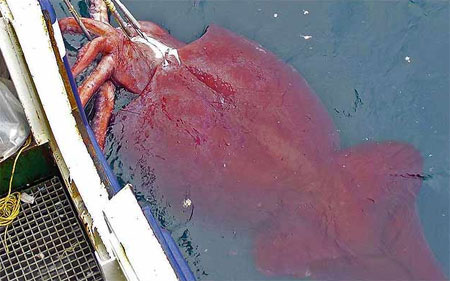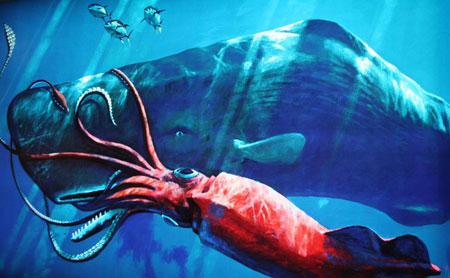'Sea monsters' are not aggressive
Longer than a bus with tentacles covered with razor-sharp spikes, giant ink was once considered a sea monster, but in fact they were not as fierce predators as in legends.

A Mesonychoteuthis hamiltoni squid weighs 495 kg, nearly 8 m long, captured in New Zealand in 2007. Photo: thesun.co.uk .
Livescience said that this finding not only goes against the scientists' understanding of the giant squid but also is a premise for the scientific community to reassess their role in the whole ecosystem in degree. 914-1,830 m deep in the Antarctic sea.
The new perspective on giant squid stems from the analysis of data by two Rui Rosa oceanographers of the University of Lisbon (Portugal) and Brad Seibel from the University of Rhode Island in the United States. They observed the relationship between metabolism (ie how the cells in the body convert food into energy) with body size in smaller squid species in the same family as this species, then use Using the results obtained to predict the metabolism in giant squid Mesonychoteuthis hamiltoni .
Contrary to initial expectations, they found that the giant squid had slow metabolism and thus also moved more slowly. They often wait for prey rather than actively seeking.
'People still think they are aggressive predators, but the results show the opposite. The squid weighing about half a ton with thorny tentacles is no different from a big drop , " Rosa told Livescience.
Legends say giant ink attacks boats and kills sailors, but new research creates an image of an almost inactive creature. Instead of chasing prey, giant squid is waiting for the fish to swim across to catch.

Artwork of giant ink fighting whales.Photo: hmns.org.
Rosa believes that if the giant squid consumes less energy, it is most likely not the whale's favorite food source.
'Because this squid is colder than we thought, they don't really contain much nutrition. "Whales will not be able to get much energy from giant squid, because if they do, they will have to consume a lot of ink to maintain life ," Rosa said.
At the same time, Rosa also emphasized that understanding of giant squid is still very limited. So new discoveries can refute existing arguments. In fact, giant squid species live in too deep and cold waters so scientists have a lot of difficulties in collecting data about them.
'We have not actually conducted direct research because we cannot go down to the ocean and catch one. Mankind understands the moon in heaven rather than the deep sea on earth. This obvious fact is most evident in Antarctica, " Rosa commented.
- The reason people always like to watch stories about sea monsters
- If you are aggressive, so is your dog
- The most frightening 'monsters' in Russian legends
- The mysteries of Argentinian ants are aggressive
- The monsters in the lake make humans terrified
- Sea monsters really exist?
- Video: A close-up of terrifying sea monsters
- Search for traces of 3 giant monsters on Earth: The scientific world cannot ignore it
- Fossils suspected of being evidence of monsters eating whales
- Jurassic fossils discovered Jurassic sea 10m long
- Detecting genes 'aggressively' after drinking
- These are 5 prehistoric monsters that deserve to be filmed like Megalodon
 Surprised: Fish that live in the dark ocean still see colors
Surprised: Fish that live in the dark ocean still see colors Japan suddenly caught the creature that caused the earthquake in the legend
Japan suddenly caught the creature that caused the earthquake in the legend A series of gray whale carcasses washed ashore on California's coast
A series of gray whale carcasses washed ashore on California's coast Compare the size of shark species in the world
Compare the size of shark species in the world